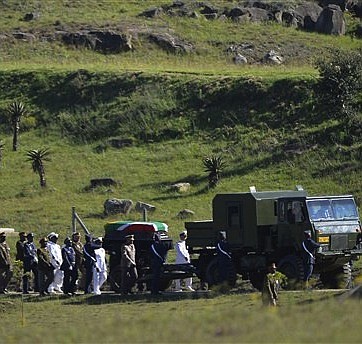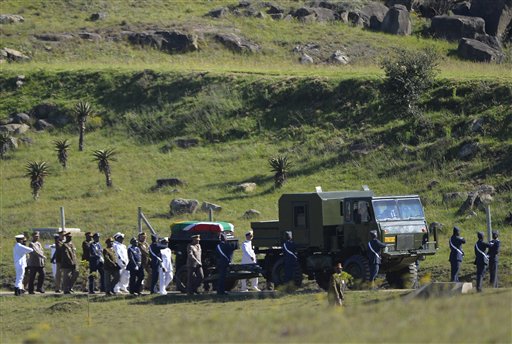QUNU, South Africa - Big guns fired a salute in the rural village where Nelson Mandela grew up and military servicemen marched stiffly behind his casket on a winding dirt road Sunday as South Africa said goodbye for the last time to the man who reconciled the country in its most vulnerable period.
Several thousand guests, some singing and dancing, gathered in a huge tent at the family compound of the anti-apartheid leader, who died Dec. 5 at the age of 95 after a long illness.
Guests included senior South African officials, veterans of the fight against white rule and foreign diplomats, including U.S. Ambassador Patrick Gaspard. Britain's Prince Charles, entrepreneur Richard Branson and former Zimbabwean prime minister Morgan Tsvangirai were also there.
Mandela's portrait was placed behind two rows of candles in the white, dome-shaped marquee. Outside, South African honor guards from the army, navy and air force marched in formation. Mandela's casket, covered by a national flag, was transported on a military vehicle to the tent, where pallbearers carried it on a red carpet into the tent where guests awaited.
After the funeral ceremony, a smaller group of guests was to attend Mandela's burial at a family grave site on the estate in Qunu, a rural village in Eastern Cape province.
The burial will end 10 days of mourning ceremonies that included a massive stadium memorial in Johannesburg and three days during which Mandela's body lay in state in the capital, Pretoria.
Mandela's casket arrived at the family compound from the capital on Saturday. It was accompanied by an enormous convoy of police, military and other vehicles.
Mandela spent 27 years in jail as a prisoner from apartheid, then emerged to lead a delicate transition to democracy when many South Africans feared that the country would sink into all-out racial conflict. He became president in the first all-race elections in 1994.
While South Africa faces many problems, including crime, unemployment and economic inequality, Mandela is seen by many compatriots as the father of their nation and around the world as an example of the healing power of reconciliation.

